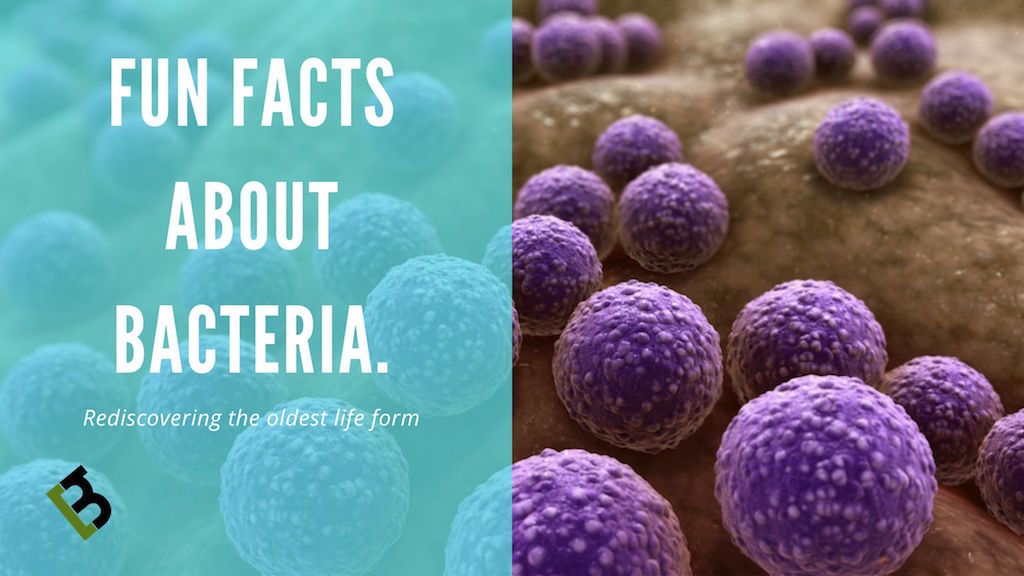Bacteria: The oldest life form on this planet is a crucial aspect of our existence. It exists everywhere on this planet. Invisible to the naked eyes, Bacteria are microscopic organisms that are found everywhere on this planet. Despite being researched for so long, it has some facts that most of us do not know.
Bacteria: Fun Facts
- Past. Present. Future
- Bacteria, along with their cousins archaea, are the oldest life forms of this planet. They have outlived almost all the organisms and creatures that have existed on this planet. To be precise, they are about 3.5 billion years old and will continue to exist even after the extinction of human race.
- Longer than Indian TV Soaps
- If the Bacteria are lined up from end to end, they would stretch out around 10 billion light years. That’s quite incredibly the distance from here to the edge of the visible universe (even the combined multiverse of Indian TV soaps).
- Fast and Serious
- Bacteria reproduce quickly via Binary Fission. An ocean-dwelling bacterium, Pseudomonas natriegens, can go from being born to ready for reproduction in ten minutes flat. Theoretically, a single cell could give rise to more than a billion offspring in five hours.
- 1674, the year of discovery
- Dutch scientist Antonie van Leeuwenhoek spotted them first while fiddling with his newly invented microscope. He found them as he was looking at scrapings from the human mouth.
- No Escape
- You can run, you can hide, but you can’t escape them! Our bodies have far more bacterial cells than human cells, almost 10 times more! Despite a recent study casting a doubt on this widespread assertion, it is said to be quite a lot of bacterial cells.
- Catch them if you can
- The notorious E. coli can travel 25 times their own length in 1 second. Imagine a car running about 220 km per hour, that’s how fast they are!
- Adapt. Fast. Real Fast.
- This is a bit concerning and has put many researchers in a fix. Bacteria are amazingly skilled at developing resistance towards antibiotics. This makes it difficult to find an antibiotic that will work on an individual. Recent cases of UTI and its treatment are the new headache of researchers. Bacterial vaginosis is the name of this new headache where a large number of antibiotics are becoming futile against this bacteria.
- The OG Eternal
- Mitochondria, our powerhouse, is likely developed from bacteria! The endosymbiotic hypothesis for the origin of mitochondria suggests that mitochondria are descended from specialized bacteria. Engulfed prokaryotes that once lived as independent organisms then evolved into Mitochondria, which supplies energy to almost every cell of our body.
- Better Communicator than Thor
- Bacteria speak with one another utilizing electrical signals. Along these lines, single-celled microorganisms can behave like a multicellular life form. A colony of billions of cells can convey and cooperate like a “microbial brain”.
- God of Rain and Snow
- Bacteria can even cause to form rain and snow. They are extremely effective ice nucleators, which allow ice to form. Some bacteria are known to be super effective at stimulating condensation, thus making it rain. Some researchers have also suggested to spray bacteria into clouds to end drought.
- Gold Pooper or the Midas Touch
- Scientists have discovered that Bacteria can ingest toxic metal compounds and convert them into the element’s metallic form without any apparent danger to itself. The first to be discovered was the rod-shaped C. metallidurans which ingested toxic gold compound and pooped gold nuggets. Cupriavidus metallidurans and Ralstonia metallidurans are the successors to be known to have the same properties.
- Tougher than Adamantium & Vibranium combined
- Bacteria can survive in a variety of extreme conditions making it tougher than anything you have ever known. Bacteria were found living almost two miles underground in a 2006 probe at a South African gold mine. They survived on the energy given off by the radioactive rocks around them.
- Even Superman can’t destroy it
- A type of bacterium called Deinococcus radiodurans, can survive almost 10,000 times the dose of radiation lethal to humans. It has been dubbed as the doomsday bacteria, as there’s nothing on this planet that can take this amount of damage and still survive.
- Natural Good Bois
- Apart from the dreaded things mentioned above, most bacteria are harmless. In fact, most of them help us in activities like digestion and defense against dreadful diseases. Of all the bacteria in the world, less than 1 percent will make you sick. These 1% are called Pathogens.
- Fat Losers
- Bacteria aid in the digestion of food. Research has found that microbial diversity in the gut has the ability to cause or prevent obesity. Scientists and Researchers hope that we can prevent obesity leading to a healthy life in the near future.
- Cheesy Creators
- Microbes also aid in the creation of favourite snacks like Bread pickle, sourdough, yogurt and many types of cheeses.
- More Bacteria Awaits
- Think we know enough of bacteria? Well, the adventure of J. Craig Venter, of trolling the high seas and analyzing the water, resulted in finding out more than a million never-before-seen bacterial genes. And this happened in 2003!
- Misplaced Notions
- A widespread common notion is that if you have a sore throat or cold, you can consume an antibiotic eg. azithromycin. However, research says that such is not the case. Bacteria do not cause cold or sore throat but it is the viruses that cause it. So, it is advisable to take proper medical diagnosis before jumping onto this conclusion.
- Bacteria can help to clear oil spills
- One of the many tragic man-made havoc is the oil spill which not only pollutes the water bodies but also destroys the marine biodiversity. Owing to its properties of ingesting harmful toxic compounds, scientists are working on developing strains of bacteria that can eat oil. They intend to release colonies of these organisms into the water and earth destroying the oil without harming the environment.
- The OG Creator
- Research suggests that we would not exist without bacteria. The oxygen we breathe was probably created with the help of bacteria! Every plant needs nitrates from soil in order to produce essential elements called Amino Acids. Amino acids are also called as the building blocks of protein. Bacteria provides the much-needed nitrates to the plants thereby setting off the wheel of life in motion.
So, these were the fun facts about Bacteria collated by our team. If you have any more, do let us know on our social media or email or simply by commenting below.
We hope that you have learnt something new about Bacteria by reading this article. If you like this article, do share it with your friends and family.
If you want to read more about bacteria click here.

